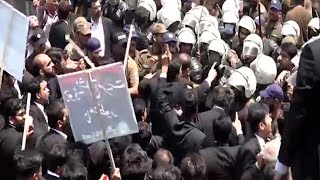 RIYADH: Saudi Arabia unveils its 2016 budget on Monday with the oil powerhouse expected to project a huge deficit following the collapse of crude prices.
RIYADH: Saudi Arabia unveils its 2016 budget on Monday with the oil powerhouse expected to project a huge deficit following the collapse of crude prices.
The world's biggest oil exporter posted a budget deficit of $17.5 billion last year, the first since 2009, and is forecast to post a shortfall of about $130 billion this year.
In a break with past practice, three Saudi ministers and a senior official of state oil giant Aramco will appear at a press conference in Riyadh on Monday to explain the new budget.
The 2016 budget, the first since King Salman took over the country in January, may contain significant changes in spending and revenue policy as Saudi Arabia adapts to oil prices that have fallen by more than 60 percent since mid-2014 to below $40 a barrel.
The dive is largely due to Saudi Arabia's own policies and those of other OPEC nations, who are refusing to cut production as they seek to drive less-competitive players, including US shale producers, out of the market.
Riyadh maintained high spending this year, and launched an expensive military intervention in Yemen, by tapping into the huge fiscal reserves it accumulated when oil prices were high.
The kingdom withdrew more than $80 billion from its reserves, which stood at $732 billion at the end of 2014. It also issued an estimated $20 billion of domestic debt.
The International Monetary Fund and other institutions have advised Riyadh and other Gulf countries, which rely heavily on oil income, to diversify their economies and reduce spending, especially on generous state subsidies and wages.
Salman told the consultative Shura Council on Wednesday that he had ordered economic reforms.
"Our vision for economic reform is to increase the efficiency of public spending, utilise economic resources and boost returns from state investment," he said.
Oil income accounts for more than 90 percent of public revenues in Saudi Arabia.






















Comments
Comments are closed.